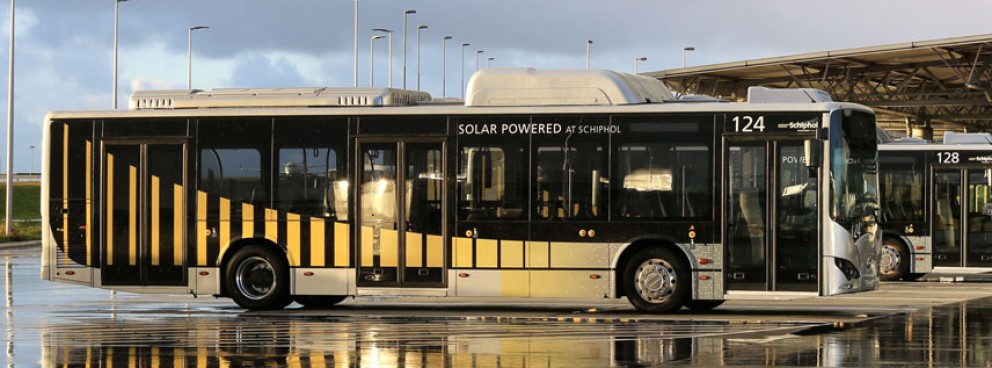Sustainable buses at airports
Schiphol Group, the owner of the Netherlands largest airport, wants Schiphol Airport to become a more sustainable airport. One of the key factors in achieving this goal is to make the bus fleet on the airport more sustainable. The diesel buses that brought passengers from the terminals to their airplanes had to be replaced. Due to the short travel distance, diesel buses were not very suitable for the job, which resulted in wear and tear and high maintenance costs. Full-electric buses were seen as both a more sustainable and more reliable alternative.
First, Schiphol Group conducted a feasibility study themselves, and then asked inno-V to assist them in both the process of tendering as well as the construction and delivery phase. They selected inno-V for this project because of our experience with tendering electric buses on the Dutch island of Schierrmonnikoog, as well as our experience with sustainable buses in several public transport contracts..
After the project at Schiphol Airport inno-V supported the tendering, construction and demand of electric buses at Brussels Airport, in cooperation with Grondwerk PM. Prior to the project inno-V and Grondwerk PM conducted a feasibility study, in which we compared diesel, gas and full-electric buses on three aspects: technical, financial and environmental effects.
inno-V was one of the pioneers in sustainable bus transport in the Netherlands. We assisted the Dutch province of Fryslân with the tender of full-electric buses on the island of Schiermonnikoog, the first such tender in the world. Since 25 April 2013, all public transport on the island is operated with a fleet of full electric buses.
Schiphol Airport
In the Schiphol project, inno-V supported the Schiphol Group by writing the tender documents (Terms of Reference) for the tender, developing the awarding criteria and organizing the selection and awarding process. Several both European and non-European companies placed a bid on the tender, which were then reviewed on both price and qualitative criteria. The bids clearly showed that much progress has been made in the field of electric buses in recent years. Eventually, the Chinese company BYD won the tender.
In cooperation with Schiphol Airport, inno-V then supervised the construction of the 35 buses. In November 2015 the buses were taken into service at Schiphol Airport, to full satisfaction of the Schiphol Group.
Source: Amsterdam Airport Schiphol via Youtube
Brussels Airport
In 2015, we started working on the Brussels Airport project. Here, the goals were the same: making the airport more sustainable. However, electric buses were not the only option. In cooperation with Grondwerk PM, inno-V conducted a feasibility study on diesel, gas (CNG) and electricity. Part of this study was a comparison of the emission levels and the Total Cost of Ownership (TCO). It could be concluded that electric buses led to positive results in terms of emission, and would be financially and technically feasible.
Thereafter we developed the Terms of Reference and awarding criteria for the Brussels Airport tender. This was a European tender with pre-selection. The pre-selection process led to a couple of companies who were in the race to make a bid. Before the end of 2016 we will know which candidate won the tendering. Inno-V and Grondwerk PM will then support the airport in the following year in supervising the construction and delivery phase.
Developments in the field of electric buses have happened fast lately, both in Europe and beyond. This results in a strong lobby by companies and other organizations in the field. In this growing market inno-V positions itselve as a neutral party, with experience and expertise on sustainable, technical and financial aspects. We are aware of the clients needs and can help them in developing a realistic approach and in making decisions that will lead to more sustainable bus transport.
